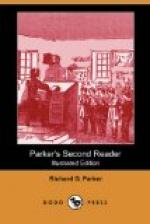11. She imagined that he was an English spy, sent there merely for the purpose of prying into the state of her empire and her government. She therefore employed two Russian soldiers to seize him, and convey him out of her dominions.
12. Taken, he knew not why, and obliged to go off without his clothes, his money, or his papers, he was seated in one of the strange-looking sledges used in those northern deserts, and carried through Tartary and White Russia, to the frontiers of Poland.
13. Covered with dirty rags, worn out with hardships, sick almost unto death, without friends and without money, he begged his way to Konigsberg, in Prussia.
LESSON LIV.
The same subject, concluded.
1. In this hour of deep distress, he found a person willing to take his draft for five guineas on the Royal Society of England. With this assistance, he arrived in the land of our forefathers.
2. He immediately applied to his ever-ready friend, Sir Joseph Banks, for employment. Sir Joseph, knowing that nothing suited him better than perilous adventures, told him that a company had just been formed, for the purpose of penetrating into the interior of Africa, and discovering the source of the river Niger.
3. Burning sands, savage negroes, venomous serpents, all the frightful animals of the torrid zone, could not alarm the intrepid soul of Ledyard. He immediately expressed his desire to go.
4. When the map was spread before him, and his dangerous journey pointed out, he promptly exclaimed, “I will go to-morrow morning.”
5. The gentleman smiled at his eagerness, and gladly intrusted him with an expedition in which suffering and peril were certain, and success extremely doubtful. He left London on the 30th of June, 1788, and arrived in Grand Cairo on the 19th of August.
6. There he spent his time to great advantage, in searching for and deciphering the various wonders of that ancient and once learned land.
7. His letters from Egypt were delightful. They showed much enthusiasm, united with the most patient and laborious exertion. The company formed great hopes concerning his discoveries in Senaar, and awaited letters from that country with much anxiety.
8. But, alas! he never reached there. He was seized with a violent illness at Cairo; died, and was decently buried beside the English who had ended their days in that celebrated city.
9. We should never read accounts of great or good men without learning some profitable lesson. If we cannot, like Ledyard, defend Gibraltar, sail round the world with Captain Cook, project trading voyages to the north-west coast, study Egyptian hieroglyph’ics, and traverse the dreary northern zone on foot,—we can, at least, learn from him the important lesson of perseverance.
10. The boy who perseveringly pores over a hard lesson, and who will not give up an intricate problem until he has studied it out, forms a habit, which, in after life, will make him a great man; and he who resolutely struggles against his own indolence, violent temper, or any other bad propensity, will most assuredly be a good one.




